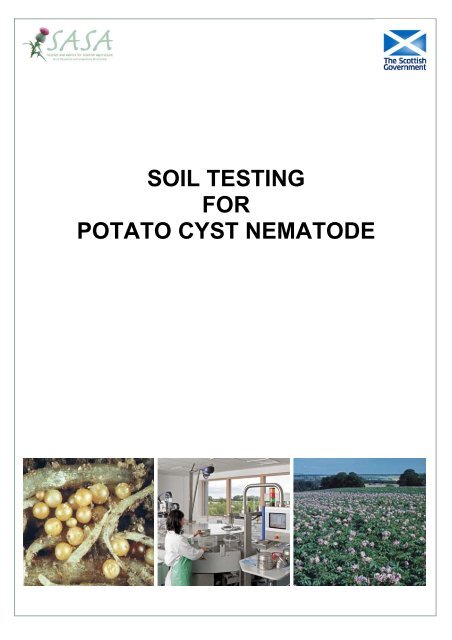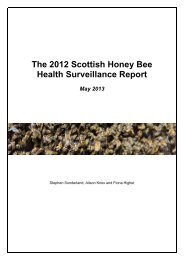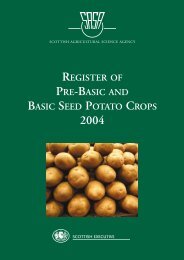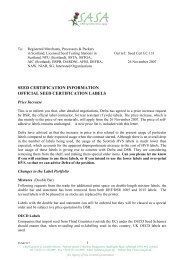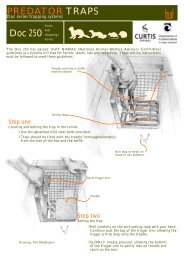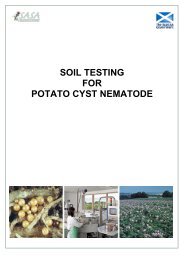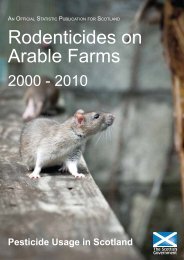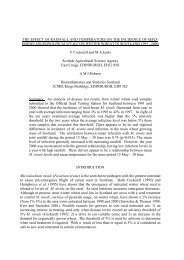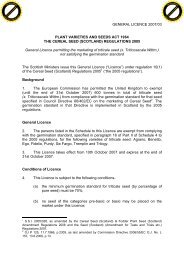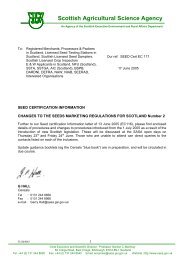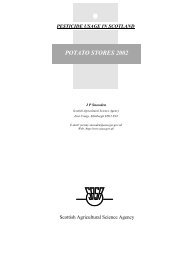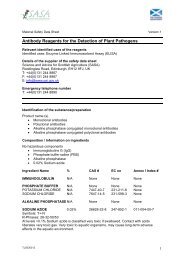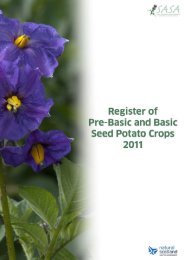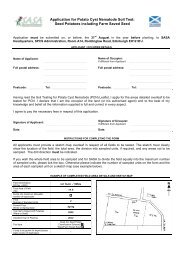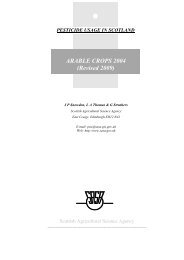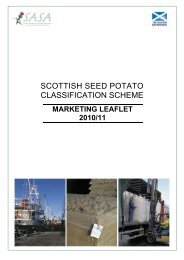SOIL TESTING FOR POTATO CYST NEMATODE - SASA
SOIL TESTING FOR POTATO CYST NEMATODE - SASA
SOIL TESTING FOR POTATO CYST NEMATODE - SASA
You also want an ePaper? Increase the reach of your titles
YUMPU automatically turns print PDFs into web optimized ePapers that Google loves.
<strong>SOIL</strong> <strong>TESTING</strong><strong>FOR</strong><strong>POTATO</strong> <strong>CYST</strong> <strong>NEMATODE</strong>
CONTENTSPage1. Application for soil tests 22. PCN – Background 23. Crops requiring PCN testing 34. Eligibility for SPCS 45. Fees 46. Sampling rates and sampled units (part fields) 47. Results of soil tests 78. Existing scheduled land 89. Derecording / descheduling 810. Ware survey 811. Movements of bulk soil 912. Non-EU exports – Phytosanitary Certificates 913. Ware Export 1114. Contact details 1115. Complaints and comments 11Annex A Other plants subject to controls 13
ForewordAs you will be aware 2010 saw the introduction of the new arrangements for soil samplingfor PCN as a result of the implementation of Directive 2007/33 EC. This resulted in a numberof changes that you, the land owners and growers and ourselves here at <strong>SASA</strong> and ourcolleagues at the Area Offices around the country have had to deal with.I would like to acknowledge your assistance in making the new system work and can reportthat there have been no major problems so far with applications for testing for the 2011growing season. Hopefully as we continue to refine the operation of our integrated databaseand new testing methodologies, we can build on this encouraging start and you, asapplicants, will receive an even better service from RPID- Area Offices and <strong>SASA</strong> in 2011-2012.We are still receiving applications for sampling for 2011 at this time and these very lateapplications place disproportionate strain on our capacity to provide results prior to planting.Your assistance in submitting your application at the earliest possible date and prior to the31st August closing date each year would of course be much appreciated. This will help usto help you.This leaflet for 2012 has been amended to reflect the new arrangements and therefore allthe old terms and references from the previous system have all but gone! One new item forthis year is that if you are able to scan your completed application form to produce anelectronic file, we can now accept your applications via e-mail. Please send them toSPCSApp@sasa.gsi.gov.uk and enter PCN in the subject box.Please do take time to read through this leaflet and if you need any assistance please do nothesitate to contact the SPCS Administration Team at <strong>SASA</strong> or your RPID Area Office.Best wishesCharlie LaingSPCS Administration Manager1
1. APPLICATION <strong>FOR</strong> <strong>SOIL</strong> TESTSAn application form and notes for completion are enclosed with this leaflet. Further copiesare available from <strong>SASA</strong>’s website, www.sasa.gov.uk, from SPCS Administration or from your localRPID Area Office, or you are welcome to make photocopies. Contact details are in section 14.In all cases where potato crops that require a PCN test are to be planted in 2012, applications forsoil sampling should be received at <strong>SASA</strong> not later than 31 August 2011. The results for allapplications received before 31 August will be issued in time for planting in spring 2012. Ifapplications are received later than 31 August, this cannot be guaranteed. We aim to issue theresults of 95% of all applications received before 31 August before 31 December 2011.Applications should be submitted as early as possible, to enable both inspectors and <strong>SASA</strong> tomanage the workload and to allow for sampling visits to be arranged around the production ofother crops in the fieldThe application form can be submitted by e-mail to SPCSApp@sasa.gsi.gov.uk. Please enterPCN in the subject box.The application form can also be used to request a post harvest/post planting test for the export ofware potatoes. See Section 13.Queries about soil sampling for non-potato crops, plants and plant products should be directedto the Scottish Government Horticulture and Marketing Unit, emailhort.marketing@scotland.gsi.gov.uk.PLEASE DO NOT COMPLETE THE APPLICATION <strong>FOR</strong>M UNTIL YOU HAVE READ THISLEAFLET AND THE NOTES <strong>FOR</strong> COMPLETION2. PCN - BACKGROUNDPCN can cause significant loss of yield in potato crops. They multiply rapidly when potatoes andother host plants are grown, and persist in the soil for many years. Controls are in place in mostpotato-producing countries to limit the increase and spread of PCN.Scotland currently has a low incidence of PCN, and is free of other quarantine diseases of potato.This allows us to produce classified seed potatoes of high health status for the ware industry inScotland and other parts of the UK, and for export. Preventing the spread of PCN is essential tomaintain the supply of land suitable for potato production, both seed and ware.There are two species of PCN, G. rostochiensis and G. pallida, with some differences betweenthem which affect how they can be controlled. G. rostochiensis was previously dominant in allparts of the UK, but G. pallida is now dominant in England and increasing in Scotland.The main route by which PCN spreads is through the movement of infested tubers and in soilwhich may be transferred on plants, waste material or farm machinery. There is also a risk ofcontamination through washing water. The higher the population of PCN in a field the greater therisk of spreading it to other land.PCN populations decline naturally in the absence of host plants, so long rotation periods are aneffective control method. Resistant varieties can also be used to control the pest, but their uptakedepends on these varieties being desirable to the market. Other measures such as nematicidesand trap crops may also be part of a control programme, but none will eradicate PCN without longrotations.2
Farmers who grow potatoes, or who rent out their land for potato production, should be aware at alltimes of the risks of soil-borne pests and diseases and should take care in bringing soil or materialthat may have soil attached onto their land, or moving it around.3. CROPS REQUIRING PCN <strong>TESTING</strong>Classified Seed PotatoesIt is a requirement of the Seed Potato Classification Scheme (SPCS) that all crops entered forinspection must be grown on land for which a PCN clearance certificate is in force at the time ofplanting, issued by <strong>SASA</strong>. Potatoes planted before a certificate of clearance has beenreceived will not be eligible for inspection.Farm saved seedIn Scotland it is not permitted to plant any potatoes except classified seed potatoes or one year’sdirect progeny of them. That progeny is described in this leaflet as farm saved seed. Farm savedseed may not be sold or transferred to any other person, but may be planted by the grower forware production.The new PCN Directive recognises that all movement of seed potatoes poses risks of spreadingPCN, and therefore the new system applies to farm saved seed as well as to classified seed.All potatoes intended for replanting as farm saved seed must be produced on land for which a PCNclearance certificate issued by <strong>SASA</strong> is in force at the time of planting, unless they are to bereplanted on the same holding where they were produced. Holdings will be identified by farmcode. Where units have been amalgamated, land will only be considered to be “on the sameholding” if it is in the same parish, or contiguous across a parish boundary.The origin of farm saved seed may be checked at any time, for example during ware inspections,using information from PP1 forms and other sources. If crops are found which contravene thePCN testing requirements, action will be taken to minimise the risk of spread, which may includedestruction of the crop, and the grower may be prosecuted.In all cases, testing must be carried out prior to planting.Ware potatoesThere is no requirement to test land before planting a crop of ware potatoes, where none of thecrop will be retained as farm saved seed for further planting.Potatoes for ExportNon-EU countries may have additional requirements for PCN freedom, for both seed and warepotatoes. Please see section 12 for details.Potatoes grown on rented landIf you intend to plant potatoes on rented land for inspection within the SPCS or for farm savedseed, it is your responsibility to ensure that the relevant valid clearance certificate is in place. Ifyou have not arranged for PCN testing yourself you should ask the owner for sight of the certificatebefore planting.If you plant any potatoes, including ware, on rented land it is your responsibility to check beforeplanting that there are no restrictions on the land due to findings of PCN or any other pest or3
disease. The owner of the land should have this information; SPCS Administration or the localArea Office can also confirm the status of the land.Non Potato CropsRestrictions to control PCN also apply to some other vegetable and fruit crops and flower bulbs, ifgrown in soil for replanting. Details of these are provided in Annex A.4. ELIGIBILITY <strong>FOR</strong> SPCSGrowers wishing to enter crops into the SPCS should be aware that land is not eligible for plantinguntil the required rotation gap has elapsed since the planting of the previous potato crop. Theserotation gaps are:Pre-basic (PB) – the land on which seed potatoes are to be planted must not have grown a potatocrop during the preceding 7 years.Super Elite/Elite (SE/E) – the land on which seed potatoes are to be planted, must not havegrown a potato crop during the preceding 5 years.Approved stocks – must comply with the above requirements, as appropriate.Clearance certificates from tests carried out in 2011-2012 will be valid for planting crops from 2012to 2015. Please use the following table to check that the result of your soil test will be valid for theyear in which you plan to plant potatoes for entry into the SPCS. If you are unsure about validityplease contact SPCS Administration.Year last plantedEarliest date eligible for plantingSE/EPre-basic2006 2012 20142007 2013 20152008 2014 20162009 2015 20175. FEESThe fee is £13.81 for each 400ml of soil to be tested.Section 6 explains how much soil is required in different circumstances, and includes a readyreckoner for fees.After an application has been received and checked, an acknowledgement will be issued to theapplicant by SPCS Administration to confirm that it is valid. The acknowledgement will alsoconfirm the fees to be charged. An invoice will be sent to the applicant after the results have beenissued. Please do not send payment until you receive the invoice.6. SAMPLING RATES AND SAMPLED UNITS (PART FIELDS)The amount of soil to be taken from each field depends on its history of the field or sampled unitand the area from which the sample is taken. Since the fee is based on the amount of soil tested,lower sampling rates will be reflected in lower fees for the applicant.4
Field/ Sampled Unit HistoryTwo soil sampling rates are set out in the PCN Directive, to provide harmonisation across all EUMember States.The standard rate is 1500ml/ha.The lower rate is 400ml/ha.A unit is eligible for the lower rate if:a. No potatoes have been grown there for 6 years prior to the test; orb. No PCN have been found in the previous 2 official tests; orc. No PCN or dead cysts have been found in the most recent official test.(b) and (c) will not apply if any potatoes have been planted in the land other than those for which aclearance certificate was in place following an official test, over these respective periods.The unit will be sampled at the standard rate if any part of the unit fails to qualify for the lower rate.All derecording (descheduling) tests will be carried out at the standard rate.<strong>SASA</strong> holds records for all previous official PCN tests, to check whether the sampled unit is eligiblefor the lower rate. <strong>SASA</strong> will also check when potatoes were last grown in the unit by reference toinformation from SPCS, ware declaration forms (PP1) and, where necessary, IACS. Growers’records may also be consulted if there is a lack of official evidence. If insufficient evidence isavailable the standard rate will be used.The majority of soil samples will be analysed by a “PCR” method, which identifies any PCN DNA inthe sample, but will not identify dead cysts. For derecording tests and units for which there are noprevious test results available, visual examination will be used to identify both live and dead cysts.This approach will enable sampled units to qualify for the lower sampling rate after just one test,under condition (c) above.Size of sampled UnitsBoth the standard and lower rates of sampling can be further reduced where land is tested in largerareas, as follows:For the standard rate, 1500ml/ha reduced to 400ml/ha after the first 8ha; For the lower rate, 400ml/ha reduced to 200ml/ha after the first 4ha.Where this applies, the average sampling rate for the area will be calculated and rounded to awhole number of 400ml samples, as in the following example, so that inspectors can take soil atthe average rate across the whole sampled unit:11ha at lower rate4ha @ 400ml = 1,600ml7ha @ 200ml = 1,400mlTotal soil required = 3,000mlRounded up to full samples = 3,200ml(8 samples)(average sampling rate = 290ml/ha)11ha at standard rate8ha @1500ml = 12,000ml3ha @ 400ml = 1,200mlTotal soil required = 13,200mlRounded up to full samples = 13,200ml(33 samples)(average sampling rate = 1,200ml/ha)5
The whole field can be tested as one unit, or applicants can choose the number and size of unitsinto which fields will be divided, subject to a few restrictions set out below.These units will be described as “sampled units”. Several samples of soil will be collected fromeach sampled unit, but these will be amalgamated to provide a single result. This single result forthe sampled unit will be issued and, if PCN are found, the whole sampled unit will be recordedas infested and subject to restrictions.In general, sampled units should not be smaller than 4ha. Fields smaller than 4ha shouldnot be divided;Sampled units must have fixed boundaries on at least two opposite sides, and the directionof drilling must be from one of these to the other;If you wish to divide a field into the maximum number of units, these should be 4ha eachplus a "remainder";If the "remainder" is 2ha or larger it can be treated as a sampled unit on its own;If the "remainder" is less than 2ha it should be combined with the neighbouring 4ha unit.;Inspectors may adjust the division of a field, for practical reasons. This will be done inconsultation with the applicant;Areas clearly unsuitable for potato production will not be sampled. It is also permitted forthe applicant to designate areas within the field which are not to be sampled. These areasmust either:reach across the whole field from one boundary to the opposite one, in line with thedirection of drilling in the neighbouring sampled units; orbe surrounded by a strained 3 wire fence from before the date of sampling whichwill remain in place until after the date of harvest.Where exclusions are used the splitting restrictions above apply to the remaining field area.Where a field contains land recorded as infested and is to be divided in such a way that theland recorded as infested is present in more than one of the resulting sampled units, eachof these units will be treated as though the whole unit is infestedThe sketch map on the application form must show the nature of recognisable boundaries and thedirection of drilling. If a field is to be divided into different sampled units, or any areas are to beexcluded, this must be clearly shown and the size (in hectares) of each sampled unit and excludedarea should be indicated. Several worked examples showing different field divisions and theassociated fees are provided with the application form “Notes for Completion”.Maximum number of sampled units for different sizes of fieldField size(ha)Maximum number of Field size (ha)sampled units1 1 11 32 1 12 33 1 13 34 1 14 45 1 15 46 2 16 47 2 17 48 2 18 59 2 19 510 3 20 5Maximum number ofsampled units6
Size of sampled unit and feesSize ofLower rateStandard rateunit (ha) Total soilFeeTotal soilFeerequired (ml)required (ml)1 400 £13.81 1600 £55.242 800 £27.62 3200 £110.483 1200 £41.43 4400 £151.914 1600 £55.24 6000 £207.155 2000 £69.05 7600 £262.396 2000 £69.05 9200 £317.637 2400 £82.86 10400 £359.068 2400 £82.86 12000 £414.309 2800 £96.67 12400 £428.1110 2800 £96.67 12800 £441.9211 3200 £110.48 13200 £455.7312 3200 £110.48 13600 £469.5413 3600 £124.29 14000 £483.3514 3600 £124.29 14400 £497.1615 4000 £138.10 14800 £510.9716 4000 £138.10 15200 £524.7817 4400 £151.91 15600 £538.5918 4400 £151.91 16000 £552.4019 4800 £165.72 16400 £566.2120 4800 £165.72 16800 £580.027. RESULTS OF <strong>SOIL</strong> TESTSSoil sample free from PCNIf the soil sample is free from live PCN, a certificate of clearance will be issued which will remain inforce for four planting years, i.e. 2012 up to 2015, or until potatoes are planted in the land,whichever is earlier.If PCN are detected during additional PCN soil testing for export purposes (e.g. for Israel), for othercrops listed in Annex A or for other reasons, the certificate of clearance for planting of seed potatocrops will be withdrawn.Soil sample containing PCNIf live PCN material is found in an official soil sample, the sampled unit will be recorded asinfested. No seed potatoes may be grown in the land either for inspection within the SPCSor for farm saved seed. Ware potatoes may be grown, but only if an Official Control Programmeis in place, see below.In light of the more intensive sampling of the new system, these restrictions will apply only to thesampled unit in which live PCN material has been found. There will be no restrictions on adjoiningland or on sampled units where only dead cysts have been found.A Statutory Notice under the Plant Health (Scotland) Order will be issued to the applicantexplaining the planting restrictions. The applicant will be provided with a result showing thespecies and estimated amount of PCN found.No further application for a PCN test on the same land will be accepted for at least 6 years(see section 9).7
Official Control ProgrammeWare potatoes may be grown on land which is recorded as infested only if an Official ControlProgramme has been agreed with SG-RPID in order to suppress PCN and minimise the risk ofspreading the pest. A control programme may include the use of long rotations, resistant varietiesand other measures such as nematicides, to reduce the population of PCN over time.Guidance on control programmes is available on the <strong>SASA</strong> website and will be provided to boththe applicant and the landowner (where different) with the result of any test in which live PCN havebeen found.8. LAND SCHEDULED PRIOR TO 2010All land which was scheduled prior to the introduction of the new system for soil sampling in 2010will remain subject to restrictions under the new system until completion of a satisfactoryderecording test (see 9).All licences issued to allow the planting of potatoes of a resistant variety for ware production,expired on 31 December 2010.Anyone wanting to grow ware potatoes in land recorded as infested (scheduled) will now need toagree an official control programme with SG-RPID.9. DERECORDINGThe restrictions imposed on land which has been found infested with PCN can only be lifted afteran official soil test has been completed and found free from live cysts. The requirements forderecording are :An application for a derecording test will not be accepted until a minimum of 6 years haselapsed since the last official soil test which found PCN, or the last potato crop grown inthat field, whichever is later.All derecording tests will be carried out at the standard rate of 1500ml/ha (reduced forlarger fields as appropriate).If the test is found clear of PCN, the recording notice will be revoked and no furtherrestrictions will apply to the field. Potatoes may be grown for ware, farm saved seed orclassified seed.10. WARE SURVEYThe PCN Directive requires the Scottish Government to carry out an annual PCN survey of at least0.5% of all land on which ware potatoes have been grown in each year. Fields are selected atrandom, to ensure a representative picture of PCN distribution across Scotland, and a 4ha area ofeach selected field will be sampled, at a rate of 400ml/ha. These samples will be analysed as forpre-planting tests, to identify the quantity of each species found. There is no charge for thistesting.Fields for the survey are selected in late summer and sampled in the following February / March.The results of the survey must be reported to the European Commission by 1 April.If PCN is found as a result of testing for the ware survey, the sampled unit will be recorded asinfested and will be subject to the restrictions set out in section 7. However, even if the sample is8
free of PCN this testing will not result in the issue of a clearance certificate for production of seedpotatoes, nor for a phytosanitary certificate for export.11. MOVEMENTS OF BULK <strong>SOIL</strong>Clearance remains in place for the period specified on the certificate or until potatoes are plantedin the land, whichever is the earlier. If, however, within the period, the land is affected by major soilmoving operations, e.g. pipe-laying, road works, etc., <strong>SASA</strong> should be informed, as further testingmay be necessary.Care should be taken to ensure that any bulk soil brought on to the farm for infill is not infested withPCN; occupiers are recommended to check that contractors have had the proposed infill tested.Although <strong>SASA</strong> will not draw samples from intended bulk infill, we are prepared to examine andprovide a written report on the PCN content of samples drawn by a contractor, or his agent, anddelivered to the laboratory. Responsibility for ensuring that the sample or samples arerepresentative of the bulk soil rests with the applicant.<strong>SASA</strong> charges a fee of £14.00 + VAT for each sample of 400ml or less for the laboratory test.Enquiries about this type of test should be made to:Yvonne Cole, Nematology Laboratory<strong>SASA</strong> HeadquartersRoddinglaw RoadEdinburghEH12 9FJTel: 0131 244 8859e-mail: yvonne.cole@sasa.gsi.gov.uk12. NON-EU EXPORTS – PHYTOSANITARY CERTIFICATESPotatoes to be exported to non-EU countries and to the Canary Islands must be certified ascomplying with the plant health requirements of the importing country. Phytosanitary certificatesare issued by the local Area Offices.For most importing countries, the PCN soil testing regime set out in these notes is sufficient.However, some countries have special requirements regarding the absence of PCN from the areain which a crop for export is to be grown, or may stipulate a test of soil from tubers of the lotprepared for marketing.Additional export testing requirements for seed potatoes are in place for the following countries:Bangladesh, Pakistan: Pre-planting field soil test, no PCN found within specified distance inprevious 12 months.Israel: Pre-planting field soil test with a time requirement (10 months).Kenya, Tanzania: Field soil test with a time requirement (12 months).Brazil, Cuba, Indonesia, Jordan, Kazakhstan, Malawi, Nigeria, Pakistan, Syria, Uruguay:Consignment testIn some cases, there are also requirements for ware crops to be tested for PCN, either with aconsignment test or a field soil test. Please ensure you are aware of the requirements of theimporting country before planting your crop.9
Details of the PCN requirements for individual importing countries, for both seed and ware, can befound on the Scottish Government Potato Export website at:http://www.scotland.gov.uk/potatoexportsFields with any history of PCN should be avoided when considering planting locations for cropsintended for export to any of the countries mentioned above even where the land has a certificateof clearance for seed potato production.IsraelIsrael requires that PCN soil samples for seed potato exports must be taken from the field in whichthe crop for export is grown no more than 10 months prior to planting. If you intend planting a seedcrop for export to Israel in a field for which the clearance certificate was issued more than 10months before planting, please apply for a new pre-planting test.The results of this test will be treated as those of a standard PCN test (see section 7). If the landpasses the test, the previous certificate of clearance will be withdrawn and replaced with a newcertificate of clearance.If a seed crop is to be exported to Israel but not grown in a field for which a pre-planting soil testwas carried out within 10 months prior to planting, a field soil test is allowed during crop growth orafter harvest. In case of a positive PCN finding, the crop will not be eligible for seed and land willbe recorded as infested. There will be a charge for the test see the link to the SG Export Section atSection at 13 below.Consignment testsSoil is the main method by which PCN cysts are carried on tubers. It is essential thatconsignments for export contain as little soil as possible in order to minimise the risk of rejection bythe plant health authority of the importing country. As indicated above, several importing countriesrequire soil or other loose material contained within inspected bags to be tested for PCN(consignment test) in addition to a field soil test.The charge for a PCN consignment test is £30.50.The following action will be taken depending on what is found in the consignment test:If no live cysts are found in the sample, or if the consignment is found to be totally free fromsoil and no sample can be collected, the lot may be exported.If the sample is found positive for PCN, the lot concerned will be designated as infested. Itwill be failed for export and as seed and may only be sold as ware on the home market.Such lots must not be planted for ware production, and should not be used as animal feedexcept on farms out with potato production areas.Subsequent lots from a crop with a previous consignment test failure will not automaticallybe failed. Each subsequent lot will, however, be subject to a further consignment test. If nolive cysts are found in the soil sample, the lot may only be marketed as seed within the EU.Enquiries about exports and non-EC country requirements should be directed to your local AreaOffice or to the Potato Section at <strong>SASA</strong> – contact Anna Krakowska, 0131 244 6346, emailAnna.Krakowska@sasa.gsi.gov.uk.10
13. EXPORT OF WARE <strong>POTATO</strong>ESGuidance on the arrangements for testing land or potatoes to meet particular export destinationrequirements (e.g. Russia) can be found on the Potato Export section of the Scottish Governmentweb site at -http://www.scotland.gov.uk/Topics/farmingrural/Agriculture/plant/18273/potatoexpconds/PCNfieldware.14. CONTACT DETAILSEnquiries about soil sampling for PCN can be directed to the SPCS Administration contacts shownbelow or to your local Area Office.ApplicantsurnameContact Name e-mail Telephone FaxA-L Stephen Fotheringham Stephen.Fotheringham@sasa.gsi.gov.uk 0131 244 6348 8920M-Z Wilma Sloan Wilma.Sloan@sasa.gsi.gov.uk ” ” 6349 ” ”Details of Area Offices are available on the Scottish Government website athttp://www.scotland.gov.uk/Topics/Agriculture/AOcontacts/contactsFurther information about the Seed Potato Classification Scheme can be obtained by using thislink: www.sasa.gov.uk/seed_potatoes/index.cfm15. COMPLAINTS AND COMMENTSIf you have a complaint about the service we provide in relation to PCN soil testing, you shouldproceed as follows:-First get in touch with the person dealing with your case. You can register a complaint by letter(including email), by telephone or in person. It will help us to investigate your request/complaint ifyou set out the facts as fully as possible. We will acknowledge your complaint by return,investigate it properly, and aim to reply within 2 weeks.If your complaint relates to the actions of Area Office staff and you want it to be consideredinitially by a more senior officer, please write to the Principal Agricultural Officer at the relevantArea Office.If for any reason you remain dissatisfied, then please write to Mr P Johnston, Assistant ChiefAgricultural Officer, The Scottish Government, Rural Payments and Inspections Directorate,Saughton House, Broomhouse Drive, Edinburgh, EH11 3XD.Alternatively, if your complaint is about the handling of your application, fees, test results orthe rules covering PCN testing, please write to Mr Robert Burns at <strong>SASA</strong>, Roddinglaw Road,Edinburgh, EH12 9FJ.If for any reason you remain dissatisfied, then please write to Dr John Kerr, Head of PotatoSection, at <strong>SASA</strong>, Roddinglaw Road, Edinburgh, EH12 9FJ.If you have used the complaints procedure set out above and are still not satisfied, you may askthe Scottish Public Sector Ombudsman to consider your complaint. Your complaint must usuallybe submitted to the Scottish Public Sector Ombudsman, 4 Melville Street, Edinburgh, EH3 7NS,11
within 12 months after the day on which you first had notice of the matter which you arecomplaining about. Further information is available at www.spso.org.uk. The telephone number is0800 377 7330.CommentsOn the other hand, if you are satisfied with the service we have provided, or wish to highlight someparticular performance, we would be happy to hear from you. Should you have suggestions abouthow we can improve the service we provide, these will also be welcomed.12
ANNEX AOTHER PLANTS SUBJECT TO CONTROLSIn addition to potatoes, some restrictions apply to the production of propagating material of otherplants which are either hosts of PCN or are likely to be grown in rotation with potatoes and havethe potential to spread the pest. These controls apply only to plants grown in soil intendedfor transplanting with roots or soil attached. As these plants are usually grown in Scotlandfrom true seed and planted in soil-free composts, these restrictions are rarely expected to apply.The affected species are organised in categories as follows:A. Host plantsCapsicum spp.Lycopersicon lycopersicum (L.) Karsten ex Farw.Solanum melongena (L.)B. Other plants with rootsAllium porrum L.Beta vulgaris L.Brassica spp.Fragaria L.Asparagus officinalis L.(Sweet peppers and chillies)(Tomato)(Aubergine)(Leek)(Beet)(Strawberry)C. Bulbs, tubers and rhizomesAllium ascalonicum L. (Shallot)Allium cepa L.(Onion)Dahlia spp.Gladiolus Tourn. Ex L.Hyacinthus spp.Iris spp.Lilium spp.Narcissus L.Tulipa L.Host plants (category A) intended for planting are subject to similar restrictions as for seedpotatoes.They may only be grown in soil which has been found clear of PCN through a pre-plantingsoil test, unless they are to be used on the same place of production.In order for any field to qualify for the lower sampling rate, documentary evidence mustshow that no potatoes or other host plants have been grown in the field for the requiredperiod.Plants which have been grown in a field officially recorded as infested must not bereplanted.Plants in categories B and C, intended for planting, must be grown in soil which has either passeda pre-planting soil test, or where it can be shown that no PCN has been found in the field, or nopotatoes or other host plants have been grown in the field, for 12 years. These plants, bulbs etcare exempt from the restrictions if they are washed or brushed until practically free of soil, so thatthere is no identifiable risk of them spreading PCN. Plants in category C are also exempt if theyare intended for replanting only by professional plant or cut flower producers (not for final retailsale).13


